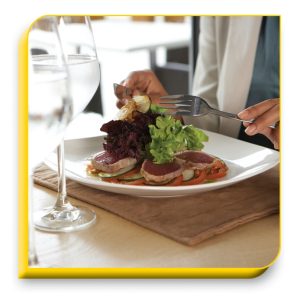 People Bond over Food and Beverage!
People Bond over Food and Beverage!
Why? Because it bonds relationships, allows powerful connections, and creates a new experience.
Our society has widely taken a casual approach to meetings over meals; however, that does not negate the importance of knowing formal dining protocol expectations and all its components, from table service and conversation to menu selection and toasting protocol. Knowing how to rebound from a mishap with finesse is also essential. Perhaps that is why my most popular seminars and workshops have centered around dining etiquette.
If you work or plan to secure a global career, adapting when a situation presents itself is essential. Every country has its unique meal-related ritual. Plus, you don’t want to be the only one eating differently.
In my book, The Art of Professional Connections: Dining Strategies for Building and Sustaining Business Relationships, I proudly address each aspect of meeting over meals with the assistance of industry specialists and clients to prepare you for a successful experience.
Secret #1: The Business of Meeting and Socializing over Meals
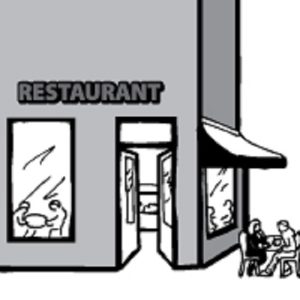 A meal accompanies most events or meetings. Achieving master diner status is critical. The master diner always thinks ahead and knows how to read their guest’s comfort level. They understand every aspect of dining etiquette. Plus, a process is involved that helps you achieve a productive meeting. Globalization and the Internet have brought people together unprecedentedly, exposing us to various dining styles and expectations.
A meal accompanies most events or meetings. Achieving master diner status is critical. The master diner always thinks ahead and knows how to read their guest’s comfort level. They understand every aspect of dining etiquette. Plus, a process is involved that helps you achieve a productive meeting. Globalization and the Internet have brought people together unprecedentedly, exposing us to various dining styles and expectations.
The secret to a successful meeting is your ability to adapt to a wide range of restaurants and expectations. This chapter will get you started.
Secret #2: Before You Dine ‘MUST KNOWS
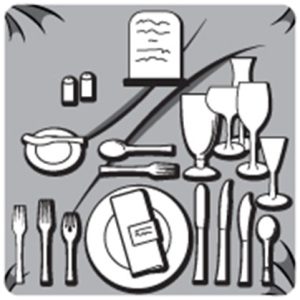 Knowing proper dining etiquette will help you navigate a complicated place setting flawlessly so that you can focus on the goal of the meeting, enjoy a wonderful meal, and develop relationships. When you are taken out of your element or comfort zone (e.g., feeling awkward), does it affect your table discussion or thought process? Most people would reply yes. If you reply no, the next time you meet a client over a meal, and the table setting or order of service differs from what you expect, you might rethink that answer.
Knowing proper dining etiquette will help you navigate a complicated place setting flawlessly so that you can focus on the goal of the meeting, enjoy a wonderful meal, and develop relationships. When you are taken out of your element or comfort zone (e.g., feeling awkward), does it affect your table discussion or thought process? Most people would reply yes. If you reply no, the next time you meet a client over a meal, and the table setting or order of service differs from what you expect, you might rethink that answer.
Before you conduct or participate in a meal meeting over dinner in a formal setting (here or abroad), research so you can navigate the unfamiliar comfortably. Globally, there are five main styles of dining and service.
The savvy professional can easily manage each and adapt when necessary. This chapter will help identify the uniqueness of various tableware and service styles.
Secret #3: Showcase Manners and Eliminate Annoyances
 It’s essential to be prepared for potential pitfalls and awkward moments. The lack of table manners sends a message of disregard and cluelessness to one’s dining peers or clients. Don’t let that be you! Impressive table manners are a strong indicator of your people skills and your sensitivity to the enjoyment and needs of others. Let that be you! Numerous types of mishaps or dilemmas can catch you off guard.
It’s essential to be prepared for potential pitfalls and awkward moments. The lack of table manners sends a message of disregard and cluelessness to one’s dining peers or clients. Don’t let that be you! Impressive table manners are a strong indicator of your people skills and your sensitivity to the enjoyment and needs of others. Let that be you! Numerous types of mishaps or dilemmas can catch you off guard.
Managing awkward or challenging moments as you demonstrate courteous table manners speaks highly of your professionalism and adaptability. This chapter will also identify problematic foods and how to manage them.
Secret #4: Building Restaurant Relationships
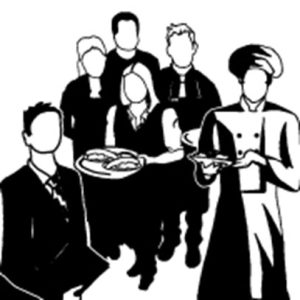 Restaurant service can vary. It’s essential to go beyond familiar dining environments and experience signature service and private club protocols. Knowing behind-the-scenes secrets to building restaurant relationships is key to a successful business meal meeting! Working effectively with the restaurant staff is to your advantage. This is accomplished by knowing every aspect of the service and meal timing. This alone puts you in the powerful position of letting your dining guest know what to expect and when.
Restaurant service can vary. It’s essential to go beyond familiar dining environments and experience signature service and private club protocols. Knowing behind-the-scenes secrets to building restaurant relationships is key to a successful business meal meeting! Working effectively with the restaurant staff is to your advantage. This is accomplished by knowing every aspect of the service and meal timing. This alone puts you in the powerful position of letting your dining guest know what to expect and when.
Building a solid relationship with a restaurant starts with respecting the staff and understanding restaurant protocols. The information shared in this chapter is based on established behind-the-scenes service protocols in private clubs.
If you work in the restaurant industry, our guidelines will help you prepare for a career or enhance your on-the-job restaurant training. This chapter is a great prep guide for anyone in the industry.
Secret #5: Orchestrating Your Meal Event
 Thorough planning should take you from selecting the venue and overseeing the reservation to the follow-up. Have you ever been expected to organize a formal meal gathering for visiting clients or prospects without any instruction or guidance? Being prepared is the hallmark of any successful meeting! Planning begins with knowing the purpose and identifying the details of making the reservation, selecting a strategic seating arrangement, and paying the check.
Thorough planning should take you from selecting the venue and overseeing the reservation to the follow-up. Have you ever been expected to organize a formal meal gathering for visiting clients or prospects without any instruction or guidance? Being prepared is the hallmark of any successful meeting! Planning begins with knowing the purpose and identifying the details of making the reservation, selecting a strategic seating arrangement, and paying the check.
It also includes knowing every phase of managing a business meal, from ordering from the menu to guiding table conversation. This chapter guides you by identifying all the “what ifs” and offers recommendations.
Secret #6: Let’s Do Lunch!
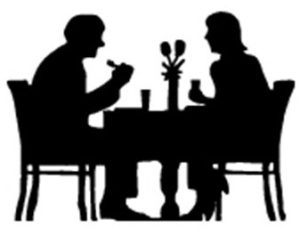 How often have you heard the words, “Let’s do lunch,” and then nothing happened? It is a famous phrase, but it only has value when you follow through. We all mean well at the onset; then “busyness” takes over, and the lunch initiative is forgotten.
How often have you heard the words, “Let’s do lunch,” and then nothing happened? It is a famous phrase, but it only has value when you follow through. We all mean well at the onset; then “busyness” takes over, and the lunch initiative is forgotten.
You have been invited to a power lunch, but then you were not sure what makes it so different, so important. Or have you had the experience of being scheduled for an interview meal but did not realize how much your table manners and “social ability” were part of the interview process?
Whether it is a casual lunch, interview meal, or status dining, it’s your opportunity to make an impactful impression. This chapter identifies nine prep steps, from the interview lunch to the seal-the-deal meal.
Secret #7: Tips for Fast-Food Eateries and Celebration Banquets
 Knowing how to transition from food courts and corporate cafeterias to celebration banquets is essential. Coffee shops and fast-food eateries present an excellent and inexpensive way to have brief meetings; however, they are also a place of business. By using these cafés or eateries for meetings (or work) and not ordering, you risk sending a self-serving message that you would not hesitate to abuse a privilege. Is this the message you want to send? Always order something! And leave the table as clean as possible. Someone always notices!
Knowing how to transition from food courts and corporate cafeterias to celebration banquets is essential. Coffee shops and fast-food eateries present an excellent and inexpensive way to have brief meetings; however, they are also a place of business. By using these cafés or eateries for meetings (or work) and not ordering, you risk sending a self-serving message that you would not hesitate to abuse a privilege. Is this the message you want to send? Always order something! And leave the table as clean as possible. Someone always notices!
An invitation to a Celebration Banquet is a privilege! If you receive an invitation and you have confirmed your attendance to attend, show up! Do not be a no-show! Your meal has been paid for, and you are expected. Not honoring the invitation sends a message of disregard. Plus, the menu and, often, the seating arrangement are pre-planned. Also, avoid requesting a menu or assigned seating arrangement change upon arrival. This request should be taken care of beforehand.
Every step of the banquet plan has a purpose. This chapter will help you navigate a wide range of casual venues to the distinct types of banquets and their expectations.
Secret #8: Wine, Spirits, and Toasting Protocol
 We drink beer; we sip wine! Beer is served in a mug; the wine glass depends on the type of wine and is held distinctly. Trying to understand all the variations of wine and beer can be mind-boggling. Furthermore, wine is expected to have a food pairing. Depending on the spice level of your food, sometimes beer or a different alcoholic spirit makes the better pairing, and then there are coffee pairings as another option. Increase your wine and spirit smarts by knowing the best food pairings. Your guests will be impressed!
We drink beer; we sip wine! Beer is served in a mug; the wine glass depends on the type of wine and is held distinctly. Trying to understand all the variations of wine and beer can be mind-boggling. Furthermore, wine is expected to have a food pairing. Depending on the spice level of your food, sometimes beer or a different alcoholic spirit makes the better pairing, and then there are coffee pairings as another option. Increase your wine and spirit smarts by knowing the best food pairings. Your guests will be impressed!
To top off a celebration, how comfortable are you giving a toast speech? Enhance your celebration toast comfort level by knowing the ritual of toasting protocols. It’s all about positioning and timing!
Did you know there are three proper times to toast during a meal? Plus, there is a toasting protocol sequence. This chapter offers step-by-step directions on offering (or being the recipient of) a toast with class and finesse.
Secret #9: Eating Globally, Dining Locally
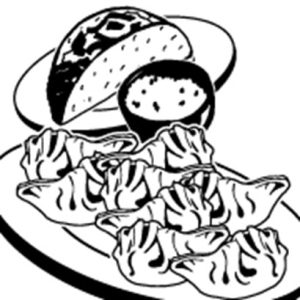 It’s a fusion dining world! The popularity of ethnic foods and the combination thereof have created even more dining confusion. Do ethnic restaurants sometimes make you feel like you need a translator or an interpreter? You are trying ridiculously hard to look savvy and order confidently, but you have no idea what to order, recommend, or even what you just ordered! Sound familiar? Plus, we are now enjoying experiences with fusion cuisines, which can get even more complicated.
It’s a fusion dining world! The popularity of ethnic foods and the combination thereof have created even more dining confusion. Do ethnic restaurants sometimes make you feel like you need a translator or an interpreter? You are trying ridiculously hard to look savvy and order confidently, but you have no idea what to order, recommend, or even what you just ordered! Sound familiar? Plus, we are now enjoying experiences with fusion cuisines, which can get even more complicated.
This section shares tips for the three most popular ethnic restaurants, Chinese, East Indian, and Mexican, to educate, create comfort, and promote enjoyment.
Bonus Section: Menu and Restaurant Language
Have you ever felt lost when trying to read a menu at an unfamiliar restaurant or experienced a menu phobia moment? It’s a linguistic jungle out there! If you are not proficient in English, French, Spanish, and Italian, you may be in trouble when trying to understand the terminology of global-infused menus. Furthermore, the influx of ethnic restaurants has made comprehending these menus even more important.
What about the wine list and the cordial cart? A glossary of over three hundred descriptions of food, wine, and spirits concludes this book. This is a must-have dining prep guide and a great cheat sheet when dining out of your league or comfort level. This closing section will increase your comfort level by helping you become well-versed in menu terminology. Plus, it offers a phonetic breakdown category to make pronunciation easier.
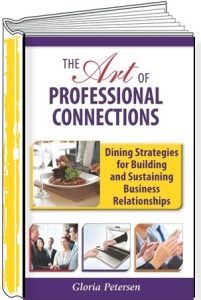 The Art of Professional Connections: Dining Strategies for Building and Sustaining Business Relationships offers proven strategies for successful business entertainment, from a simple coffee to a formal dinner.
The Art of Professional Connections: Dining Strategies for Building and Sustaining Business Relationships offers proven strategies for successful business entertainment, from a simple coffee to a formal dinner.
This book will explain the details of a successful business meal experience. It is strongly recommended that you use this book as a preparation tool (or career aid) to ensure a successful business meal experience, whether casual or formal, both domestically and globally.
««»»
You can add this edition to your professional development library by purchasing it from your favorite bookstore (in softcover and eBook formats).
Please email me at gloria@gloriapetersen.com or schedule an appointment
about how to bring a seminar or SME training to your organization.
For SME training on this topic, visit:
GlobalProtocolAcademy.com
Please share your meal meeting tips.



